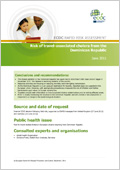Credit Wikipedia
# 6512
Considering the actual impact that it has on human health around the world, Ebola gets more than its fair share of coverage in the press.
First discovered in Zaire and Sudan in 1976, its incredibly high fatality rate and gruesome hemorrhagic symptoms have served to capture the public’s imagination.
Helped along, no doubt by movies like 1995’s Outbreak and books like Tom Clancy’s Executive Orders and The Hot Zone by Richard Preston.
As a public health threat, Ebola – which has been blamed for fewer than 2,000 deaths over the past 30+ years - pales in comparison to most of the world’s less feared infectious diseases.
Simple childhood pneumonia, claims 1.8 million lives each year (cite) and Malaria claims between one half, to one million lives a year (cite).
During an exceptionally mild flu year, more people die from influenza in the United States than have been killed by the Ebola virus over the past 3 decades.
Nevertheless, whenever an outbreak of a hemorrhagic virus occurs somewhere in the world, we are fascinated by its imagery, and its feared potential.
While it is possible (and given enough time, perhaps even inevitable) that an Ebola carrier might someday board a plane and land in Europe or the United States before exhibiting symptoms, the risks of that sparking a major outbreak are considered low.
Today, the ECDC has released a reassuring Rapid Risk Assessment on the latest Ebola outbreak in the DR Congo.
Rapid risk assessment: Outbreak of Ebola haemorrhagic fever in the Democratic Republic of Congo
Technical reports - 23 Aug 2012
ABSTRACT
In the light of an outbreak of Ebola haemorrhagic fever in the Democratic Republic of Congo, ECDC has considered the risk to public health in the EU.
The risk of becoming infected is considered to be low unless a person is in direct contact with bodily fluids of dead or living infected persons or animals. It is therefore unlikely that local or foreign citizens in the Democratic Republic of Congo will become infected. In the unlikely event that a traveller infected in the Democratic Republic of Congo arrives in the EU while incubating the disease and develops symptoms, they should seek medical attention and be isolated, which will prevent further transmission.
For some recent posts on Ebola outbreaks, you may wish to revisit:
WHO: Ebola Update
Update: Ebola Reported In Uganda’s Capital
Uganda: Ebola Sudan And A Timely Dispatch From The EID Journal
Related Post:
Widget by [ Iptek-4u ]

